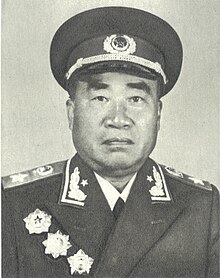Zhu De
|
Marshal Zhu De |
|
|---|---|
 |
|
| Chairman of the Standing Committee of the National People's Congress | |
|
In office April 1959 – July 1976 |
|
| Leader | Mao Zedong |
| Preceded by | Liu Shaoqi |
| Succeeded by | Ye Jianying |
| Vice Chairman of the People's Republic of China | |
|
In office September 27, 1954 – April 27, 1959 |
|
| Chairman | Mao Zedong |
| Succeeded by | Soong Ching-ling and Dong Biwu |
| Vice Chairman of the Communist Party of China | |
|
In office 28 September 1956 – 1 August 1966 |
|
| Chairman | Mao Zedong |
| Secretary of the Central Commission for Discipline Inspection | |
|
In office November, 1949 – March, 1955 |
|
| Preceded by | Li Weihan |
| Succeeded by | Dong Biwu |
| Commander-in-Chief of the People's Liberation Army | |
|
In office November 28, 1946 – September 27, 1954 |
|
| Preceded by | post established |
| Succeeded by | post abolished |
| Personal details | |
| Born |
1 December 1886 Yilong County, Sichuan Province, Qing dynasty China |
| Died | 6 July 1976 (aged 89) Beijing, China |
| Political party | Communist Party of China |
| Spouse(s) |
Xiao Jufang (m. 1912; death 1916) Chen Yuzhen (m. 1916; death 1935) Wu Ruolan (m. 1928; death 1929) Kang Keqing (m. 1929) |
| Children | Zhu Qi Zhu Min |
| Awards |
|
| Military service | |
| Allegiance |
Communist Party of China |
| Service/branch |
Yunnan clique |
| Years of service | 1927–1976 |
| Rank |
|
| Battles/wars | Encirclement Campaigns, Northern Expedition, Long March, Hundred Regiments Offensive, Chinese Civil War |
| Zhu De | |||||||||||
| Chinese | 朱德 | ||||||||||
|---|---|---|---|---|---|---|---|---|---|---|---|
|
|||||||||||
| Zhu Yujie (zì) | |||||||||||
| Chinese | 朱玉阶 | ||||||||||
|
|||||||||||
| Transcriptions | |
|---|---|
| Standard Mandarin | |
| Hanyu Pinyin | Zhū Dé |
| Wade–Giles | Chu Teh |
| IPA | Mandarin pronunciation: [tʂú tĕ] |
| Transcriptions | |
|---|---|
| Standard Mandarin | |
| Hanyu Pinyin | Zhū Yùjiē |
| Wade–Giles | Chu Yu-chieh |
| IPA | Mandarin pronunciation: [tʂú jû.tɕjé] |
Zhu De (Chu Teh; Chinese: 朱德; pinyin: Zhū Dé; pronounced [ʈʂú tɤ̌]; 1 December 1886 – 6 July 1976) was a Chinese general, warlord, politician, revolutionary, and one of the pioneers of the Communist Party of China. Born poor in 1886 in Sichuan, Zhu was adopted by a wealthy uncle at age nine; this prosperity provided him a superior early education that led to his admission into a military academy. After his time at the academy, he joined a rebel army, and soon became a warlord. It was after this period that he adopted communism. He ascended through the ranks of the Red Army as it closed in on securing the nation. By the time China was under Mao's control, Zhu was a high-ranking official within the Communist Party of China. He served as Commander-in-Chief during the Second Sino-Japanese War. In 1955, Zhu became one of the Ten Marshals of the People's Liberation Army, of which he is regarded as the principal founder. Zhu remained a prominent political figure until his death in 1976. As the chairman of the Standing Committee of the National People's Congress from 1975 to 1976, Zhu was the head of state of the People's Republic of China.
Zhu was born on December 18, 1886, to a poor tenant farmer's family in Hung, a town in Yilong County, a hilly and isolated part of northern Sichuan province. Of the fifteen children born to the family only eight survived. His family relocated to Sichuan during the migration from Hunan province and Guangdong province. His origins are often given as Hakka, but Agnes Smedley's biography of him says his people came from Guangdong and speaks of Hakka as merely associates of his. She also says that older generations of his family had spoken the 'Kwangtung dialect' (which would be close to but probably different from modern Cantonese. And that his generation also spoke the 'Szechwan dialect', Sichuanese, a distinct regional variant of Southwest Mandarin that is unintelligible to other speakers of Standard Chinese (Mandarin).
...
Wikipedia
